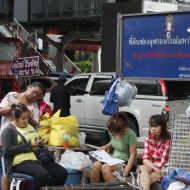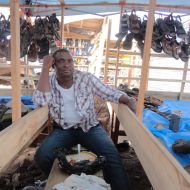Chinese Merchants in Accra Find an Eager Customer Base, and Suspicion
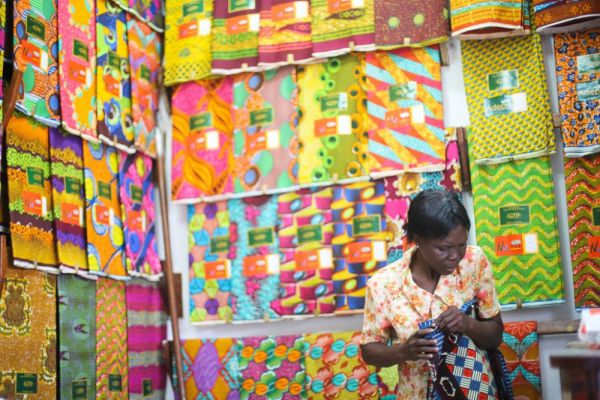
A trader in Makola measures a piece of textile. Photo credit: Yenkassa via Flickr Creative Commons
Most of the stores in the Chinese Wholesale Town are closed, their blue metal gates shut and padlocked.
“And did you see any Chinese there?” asks Tom, a Chinese man who used to go by his real name, Chao, until he got tired of correcting mispronunciations. “One,” I answer, and he laughs. “I can’t figure out why they call it that,” I add, to which he replies, “We can’t figure it out either!”
Chinese Wholesale Town is a three-story building in the midst of the dizzingly huge Makola Market in Accra’s Central Business District. The shops there have been mostly shut up for about a year, says Dinah, a cloth-seller whose small stand is in the building’s entryway.
Not far from Chinese Wholesale Town is Makola’s real “Chinatown,” where Chinese wholesalers discreetly peddle their wares. This is one source of the Chinese goods you find all over Accra, particularly here in Makola: Jewelry, clothing, furniture, electronics, textiles, many sold informally by street vendors. The shoe section is the most visible – simple, one-room shops are set back a bit from the sidewalk, while several Ghanaian retailers, mostly women, occupy the space outside surrounded by piles of shoes wrapped by the pair in clear plastic packaging.
This part of the market is where I find Tom, a young, talkative and opinionated young man. “I saw you walking around here yesterday,” he says as I sit down. A row of sample shoes line the desk in front of him. Behind him on the wall hang various certifications from the Ghanaian government, proclaiming his business’ legal right to existence and his compliance with taxes and regulations. A quietly smiling Chinese woman, his boss, sits behind us.
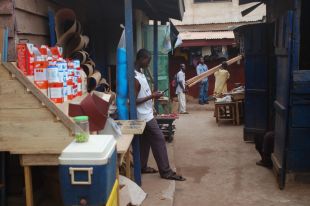
Makola Market is one source of the Chinese goods one finds all over Accra. Photo credit: Erik Hersman
Tom clearly understands business; he speaks like someone immersed in the standard language of the profession. “Time is money,” he says, explaining that the Chinese businesspeople live close to the warehouses where they store their goods. “Everyone wants to buy cheap, high-quality products,” he says later.
His story and the business he works for, which is primarily a small, independent, family operation, are characteristic of Chinese merchants in Ghana. Only Tom’s casual manner and grasp of English are unusual. He first came to Accra in 2004 to help set up the shop, spent some time in Lagos and Dubai, then went to China to marry and start a family before coming back to Accra. He has a one-year-old son at home; he is here to earn money for his family because employment opportunities in his home village are limited. “Now everything in China, it costs,” says Tom. “I get family, I get my baby. It’s not easy to leave your family.”
Chinese-run businesses in Makola like Tom’s are at the center of battles for urban markets across West Africa. Last year, in response to protests from the Ghana United Traders Association (GUTA) about Chinese incursion into Ghana’s retail market, the Ghanaian government forced many Chinese merchants to close their shops. “Because they have worried them,” my cloth-selling friend Dinah explains as we look at the empty shops of the Chinese Wholesale Town, “they’re not coming around again.”
Florence, a shoe-seller outside a shop formerly rented by a Chinese man, says she’s been buying shoes at wholesale prices and selling them here on the sidewalk for six years. “All of these are Chinese products,” she says, gesturing toward the piles of shoes in front of her. The Chinese man who used to rent the shop she sells in front of, she says, has retreated because the authorities have been harassing him.
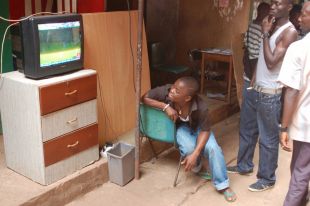
Chinese traders find that adapting to Makola’s culture makes doing business easier. Photo credit: Erik Hersman
These turf wars are often confused and conflated with other issues related to the Chinese presence in Ghana. China is often in the news, and is typically portrayed negatively, such as in recent headlines about Ghanaian government crackdowns on illegal Chinese mining activity. I’ve heard complaints about cheap, low-quality Chinese goods flooding Ghana’s market. Yet the demand for cheap Chinese products – not all of them low-quality, either – is evident everywhere in Accra. In Makola, it’s clear as day. On my way in, for example, I stop by the bookstand where I usually pick up reporters’ pads. Akua, the young woman selling them, tells me that most of her products are Chinese.
Cheap Chinese products are blamed for all manner of challenges to Ghana’s economy, especially keeping prices too low for the Ghanaian manufacturing sector to develop. Even so, Chinese imports provide a source of inexpensive goods for a hungry market that is still very price-sensitive and a source of livelihood to informal traders and retailers like Florence and Dinah.
But blaming Chinese merchants for the inflow of Chinese goods is something of a red herring, according to a report from the German Institute of Global and Area Studies. Chinese entrepreneurs like Tom, in fact, bring in a tiny minority of steadily rising imports of Chinese goods. Most are actually imported by Ghanaians themselves, who have been traveling to China since the 1980s, as well as other nationals who have set up import-export businesses. One young man selling electronics on the street told me that while most of the products he sells are Chinese, his boss, who owns a shop nearby, is a Nigerian who regularly travels to China to import the products himself.
GUTA’s concern, it seems, ultimately has less to do with Chinese goods in Ghana than about retail space in urban markets. “Our company has been here about eight or nine years,” says Tom. “When foreigners enter the market, [the local people] think we take his business. [But] we are wholesale.” Tom’s company sells shoes only by the carton, in compliance with strict legal barriers to foreigners entering the retail sector. GUTA, though, believes that Chinese merchants are encroaching into regular retail and pricing African merchants out.
Misinterpreted cultural norms, suggest two researchers from the German Institute of Global and Area Studies in another report, are in fact a major part of the conflict in Makola Market. All this misunderstanding has created, or at least fed into, a general perception about the Chinese merchants, including the stereotype that they are exploitative employers.
Tom, however, appears to be on good terms with his employees. One of them, listening to our conversation, quizzes me on my Twi language skills, and Tom interjects with “Aden?” which means “Why?” in Twi. Both laugh. Perhaps after nine years of experience with Ghana, he is among those who have figured out how to navigate some of the complex cultural dynamics at play in the urban marketplace. In these primarily informal market spaces, rapport and relationship are paramount, as Africans in Chinese cities have also discovered.
“At the core of this challenge,” writes Dr. Lloyd Amoah, assistant professor at Ashesi University, “lies the increasing financial, economic, trade, diplomatic and political engagement between Africa and China in the last two decades.” Citing similar incidents of conflict in the Chinese city of Guangzhou, where there is a growing African community, he continues, “On the Africa side a ‘yellow peril’ approach will constitute a lazy, hysterical, knee-jerk reaction that will raise needless suspicion in the mind of key players in China’s public and private sectors and potentially constrict a useful development frontier that is opening up.”
Trade can bring enrichment to both sides of the exchange, but the complex relationships between Chinese and Africans will, as Dr. Amoah implies, take time and the building of trust. If it fails, though, Tom tells me, Chinese businesses will leave Accra, find other markets and bring their little shops elsewhere.



